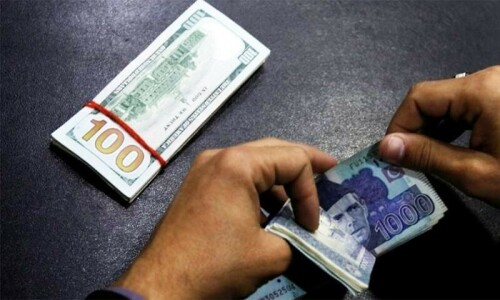KARACHI: The rupee’s depreciation is unlikely during the remaining period of the current fiscal year as inflation has left no space for its decline, experts said on Saturday.
The exchange rate looks stable since the rupee is valued below Rs280 against the US dollar, though some analysts believe it might end up at Rs310 with the completion of current fiscal year.
“The fiscal year started with USD/PKR at 286. Judging by historic trends, an annual depreciation of 7pc to 10pc is typical, which supports the exporters and maintains REER (Real Effective Exchange Rate) near par. This implies that June-end closing rates would be around 310 per dollar,” said Faisal Mamsa, CEO of Tresmark, a financial terminal for real-time market rates, charts and financial data.
“As of today, the rupee is actually stronger by around two per cent, and major depreciation looks unlikely,” he added.
Analysts say relentless inflation has left no space for currency’s decline
However, most of the analysts and researchers believe relentless inflation now covers the entire economy and all efforts are being made to deal with this uncontrolled enemy of the economy.
Not only does inflation refuse to go away, but all other policies are directed towards normalising it. It’s a global problem with most economies prioritising inflation over economic growth. This is also reflected in government’s policies. The economic growth has been compromised to counter inflation by keeping the interest rate at 22pc.
When the rupee depreciates, it adds to the imported inflation component. To avoid this, a policy to strengthen the local currency has been adopted, said an analyst. This is part of the established “reverse currency wars” with the objective to keep a lid on inflation.
The general elections scheduled for Feb 8 have also added uncertainty to the current economic scenario. Analysts say the new government is unlikely to rock the boat unless inflation cools down significantly from 29.7pc in December. Consequently, the rupee is headed towards a soft close by the end of June this year.
Exporters have failed to improve their performance despite encouragements from the government. The government is trying to fix a rate of nine cents per watt electricity for the industry which would ultimately support the exporters. The plan, however, requires approval by the IMF.
“This high cost of production has created immense pressure for the State Bank to bring down the interest rate, but the unpredictable inflation has closed the door for interest rate cut in the next money policy,” said S.S. Iqbal, a money market expert and dealer.
He said the State Bank would announce the monetary policy on Monday and most of the analysts predict no change in the interest rate, particularly due to high inflation. However, the central bank is of the view that inflation would come down in the second half of the current fiscal year.
Published in Dawn, January 28th, 2024












































Dear visitor, the comments section is undergoing an overhaul and will return soon.